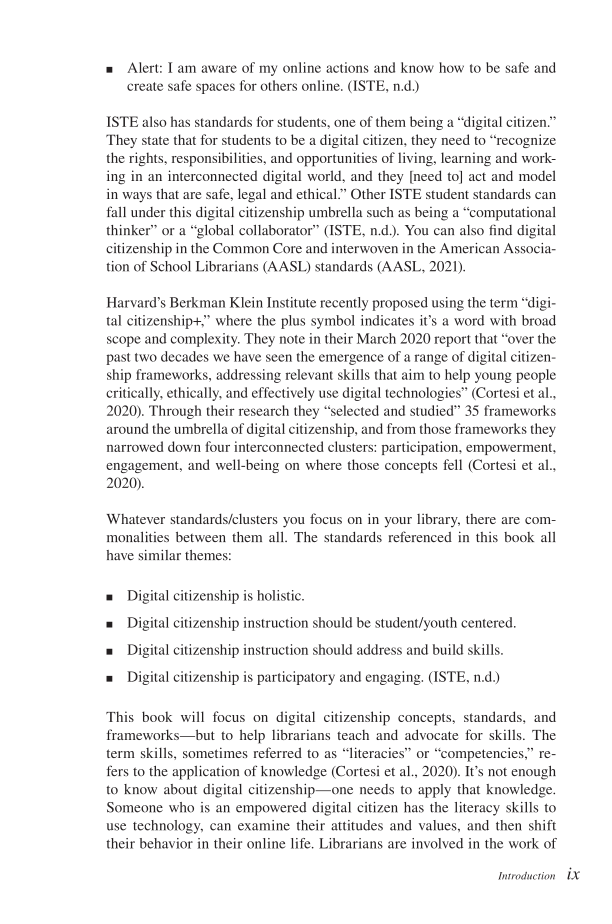Introduction ix ■ Alert: I am aware of my online actions and know how to be safe and create safe spaces for others online. (ISTE, n.d.) ISTE also has standards for students, one of them being a “digital citizen.” They state that for students to be a digital citizen, they need to “recognize the rights, responsibilities, and opportunities of living, learning and work- ing in an interconnected digital world, and they [need to] act and model in ways that are safe, legal and ethical.” Other ISTE student standards can fall under this digital citizenship umbrella such as being a “computational thinker” or a “global collaborator” (ISTE, n.d.). You can also find digital citizenship in the Common Core and interwoven in the American Associa- tion of School Librarians (AASL) standards (AASL, 2021). Harvard’s Berkman Klein Institute recently proposed using the term “digi- tal citizenship+,” where the plus symbol indicates it’s a word with broad scope and complexity. They note in their March 2020 report that “over the past two decades we have seen the emergence of a range of digital citizen- ship frameworks, addressing relevant skills that aim to help young people critically, ethically, and effectively use digital technologies” (Cortesi et al., 2020). Through their research they “selected and studied” 35 frameworks around the umbrella of digital citizenship, and from those frameworks they narrowed down four interconnected clusters: participation, empowerment, engagement, and well-being on where those concepts fell (Cortesi et al., 2020). Whatever standards/clusters you focus on in your library, there are com- monalities between them all. The standards referenced in this book all have similar themes: ■ Digital citizenship is holistic. ■ Digital citizenship instruction should be student/youth centered. ■ Digital citizenship instruction should address and build skills. ■ Digital citizenship is participatory and engaging. (ISTE, n.d.) This book will focus on digital citizenship concepts, standards, and frameworks—but to help librarians teach and advocate for skills. The term skills, sometimes referred to as “literacies” or “competencies,” re- fers to the application of knowledge (Cortesi et al., 2020). It’s not enough to know about digital citizenship—one needs to apply that knowledge. Someone who is an empowered digital citizen has the literacy skills to use technology, can examine their attitudes and values, and then shift their behavior in their online life. Librarians are involved in the work of
Document Details My Account Print multiple pages
Print
You have printed 0 times in the last 24 hours.
Your print count will reset on at .
You may print 0 more time(s) before then.
You may print a maximum of 0 pages at a time.

































































































































































































